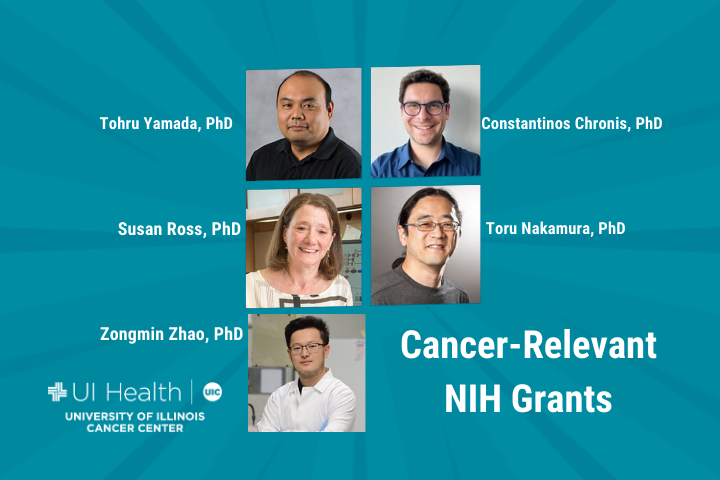
Five University of Illinois Cancer Center members were awarded more than $2.2 million in National Institutes of Health (NIH) cancer-relevant research grants, including from the National Cancer Institute (NCI).
The grants were awarded to the University of Illinois Chicago (UIC) for research projects headed up by Cancer Center members Tohru Yamada, PhD, in our Translational Oncology research program and Associate Professor, Department of Surgery, University of Illinois College of Medicine; Constantinos Chronis, PhD, in our Cancer Biology research program and Assistant Professor, Department of Biochemistry and Molecular Genetics, College of Medicine; Toru Nakamura, PhD, in our Cancer Biology research program and Professor, Department of Biochemistry and Molecular Genetics, College of Medicine; Susan Ross, PhD, in our Cancer Biology research program and Professor, Department of Microbiology and Immunology, College of Medicine; and Zongmin Zhao, PhD, in our Translational Oncology research program and Assistant Professor, Department of Pharmaceutical Sciences, UIC College of Pharmacy.
NIH Cancer-Relevant Grants
Learn more about the grants and the research projects below.
- NCI awarded $381,000 for “Hypoxia-Activated Probiotic Agents for Breast Cancer” with Yamada as project leader.
The project’s public health relevance statement excerpted from the NIH RePorter: Hypoxia is one of the most important features of the tumor microenvironment (TME) that leads to decreased sensitivity of tumor cells and poor therapeutic effects. We developed unique tools using engineered probiotic tumor-homing bacteria to selectively express cancer-killing proteins under the hypoxic environment. In combination with chemotherapeutic agents, our new probiotic bacteria-assisted approach will potentially provide effective treatment strategies that specifically target the hypoxic TME which is difficult by current therapeutic options.
- The National Heart, Lung, and Blood Institute (NHLBI) awarded $522,000 for “Reprogramming Gene Regulatory Networks to a Hematopoietic Stem Cell State” with Chronis as project leader.
The project’s public health relevance statement excerpted from the NIH RePorter: Hematopoietic stem cells (HSCs) are an extremely valuable therapeutic cell type due to their capacity to reconstitute the entire blood system upon transplantation or injury. Recent research has identified transcription factor combinations that reprogram endothelial cells to HSCs, but the mechanisms underlying this process remain unknown. Here, we propose to elucidate the molecular and cellular mechanisms by which reprogramming factors promote cell fate changes, laying the groundwork for more selective and efficient generation of clinically relevant HSCs.
- The National Institute of General Medical Sciences (NIGMS) awarded $431,000 for “Regulation of Telomere Maintenance in Fission Yeast” with Nakamura as project leader.
The project’s public health relevance statement excerpted from the NIH RePorter: Stable maintenance of telomeres is critical to preserve genomic integrity, and studies have found that defects in protein complexes that ensure telomere maintenance, could lead to various human diseases including cancer. The overall goal of this project is to provide detailed knowledge of the mechanisms that allow conserved shelterin and CST complexes to ensure stable maintenance of telomeres by controlling DNA replication at telomeres and attenuating DNA damage responses. Since proteins involved in telomere maintenance and DNA damage responses are very well conserved between fission yeast and humans, we expect our findings to help guide future studies of telomere regulation mechanisms in humans.
- National Institute of Allergy and Infectious Diseases (NIAID) awarded $518,000 for “Interplay Between Reverse Transcription and Host Restriction” with Ross as project leader.
The project’s public health relevance statement excerpted from the NIH RePorter: Retroviruses are major causes of disease in animals and humans that replicate by reverse transcribing viral RNA into DNA. The initial immune response to retroviral infection is critical to the ability to clear infection, because once the viral DNA integrates into the host chromosomes, persistent infections arise, leading to diseases such as cancer and immunodeficiencies. Here we will examine the timing and location of virus replication and host response, using unique cell culture and mouse models developed by our lab.
- NIGMS awarded $393,000 for “Multiscale Approaches to Engineering Living Cells for Nanotherapeutic Delivery” with Zhao as project leader.
Here is the project’s public health relevance statement excerpted from the NIH RePorter: Nanoparticle therapeutics are a promising therapeutic modality that are used clinically to treat a variety of diseases in different tissues, but their successful application requires precise delivery to target sites. Integrating our expertise in nanoparticle design and cell engineering, we will develop living cell inspired systems to improve the delivery of nanoparticle therapeutics by mechanistically understanding how the interface between living cells and nanoparticles impacts the migration of carrier cells and transport of nanoparticle, identifying ideal delivery parameters for engineering living cell as drug delivery carriers, and creating multiscale strategies to enable delivery to specific cells. As such, this project has the potential to positively impact public health by developing new ways to deliver and improve the biological outcomes of nanoparticle therapeutics and other therapeutics.
